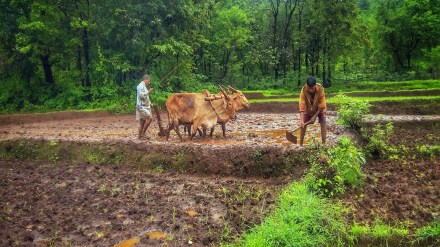Nearly 83 per cent of marginal farmers are covered under the PM Kisan Samman Nidhi (PM-KISAN) scheme. However, only 35 per cent have access to crop insurance, and just 25 per cent receive timely financial credit, a recent report revealed.
The marginal farmers form the largest group within India’s agricultural sector, comprising 68.5 per cent of all farmers, yet they possess approximately 24 per cent of the total crop area.
The survey which included 6,615 farmers across 21 states was undertaken by the Forum of Enterprises for Equitable Development (FEED) in collaboration with the Development Intelligence Unit (DIU).
It found that two-thirds of marginal farmers affected by extreme weather events have adopted climate-resilient agricultural practices. These include changes in crop duration, sowing time and methods as well as disease and water management strategies.
At least 76 per cent of those who adopted these practices faced challenges such as lack of credit facilities, physical resources, limited knowledge, small land holdings, and high upfront costs, the report found.
While 21 per cent of marginal farmers have cold storage facilities within 10 kilometres of their village, only 15 per cent have utilized these facilities.
Further, at least 80 per cent of marginal farmers in India have experienced crop losses due to adverse climate events over the past five years, the report showed.
The primary causes of crop damage were drought (41 per cent), irregular rainfall including excessive or non-seasonal rains (32 per cent), and early withdrawal or late arrival of monsoons (24 per cent).
Nearly 43 per cent of the farmers surveyed reported losing at least half of their standing crops. Rice, vegetables, and pulses were particularly affected by uneven rainfall. In northern states, paddy fields often remained submerged for more than a week, destroying newly planted seedlings.
Meanwhile, insufficient rainfall delayed the planting of various crops such as rice, corn, cotton, soybeans, groundnuts, and pulses in states like Maharashtra, Telangana, Andhra Pradesh, Chhattisgarh, Bihar, and West Bengal.
The report did not assess the impact of temperature variability.
Sanjeev Chopra, Chairperson of FEED said, “Climate change is no longer a threat somewhere on the horizon. It is here and now. The unprecedented summer heat in the NCR and across India this year is a clear indication of this crisis.”
“Developing an adaptation strategy is not optional but essential. We need to promote climate-resilient agricultural practices, diversify livelihoods, and improve access to financial services and technical advice,” he added.
(With PTI inputs)
